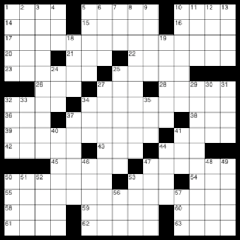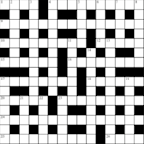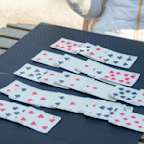Search results
Results From The WOW.Com Content Network
On 18 August 1942, a day before the Dieppe raid, 'Dieppe' appeared as an answer in The Daily Telegraph crossword (set on 17 August 1942) (clued "French port"), causing a security alarm. The War Office suspected that the crossword had been used to pass intelligence to the enemy and called upon Lord Tweedsmuir, then a senior intelligence officer ...
The codes were changed from time to time to reflect current needs. By 1922 most railways in the country had agreed on standard code words, although the GWR had an extended list of codes that could only be used within its own network. In 1943 all railways were brought into a single system of codes and the GWR special codes were discontinued.
Android. Release. February 15, 1942; 82 years ago. ( 1942-02-15) Genre (s) Word game. Mode (s) Single-player. The New York Times Crossword (marketed as The Crossword) is a daily American-style crossword puzzle published in The New York Times as part of The New York Times Games, online on the newspaper's website, syndicated to more than 300 ...
Markiplier, one of YouTube’s most-followed creators, claims he doesn’t consider the business prospects of his new projects. “I let the lawyers think about that,” he says. “I feel like ...
Budget. $14 million [4] Box office. $233.6 million [5] The Imitation Game is a 2014 American period biographical thriller film directed by Morten Tyldum and written by Graham Moore, based on the 1983 biography Alan Turing: The Enigma by Andrew Hodges . The film's title quotes the name of the game cryptanalyst Alan Turing proposed for answering ...
Code word (communication) In communication, a code word is an element of a standardized code or protocol. Each code word is assembled in accordance with the specific rules of the code and assigned a unique meaning. Code words are typically used for reasons of reliability, clarity, brevity, or secrecy.
The International Radiotelephony Spelling Alphabet or simply Radiotelephony Spelling Alphabet, commonly known as the NATO phonetic alphabet, is the most widely used set of clear-code words for communicating the letters of the Roman alphabet. Technically a radiotelephonic spelling alphabet, it goes by various names, including NATO spelling ...
A code word is a word or a phrase designed to convey a predetermined meaning to an audience who know the phrase, while remaining inconspicuous to the uninitiated. For example, a public address system may be used to make an announcement asking for "Inspector Sands" to attend a particular area, which staff will recognise as a code word for a fire or bomb threat, and the general public will ignore.
The Allied military phonetic spelling alphabets prescribed the words that are used to represent each letter of the alphabet, when spelling other words out loud, letter-by-letter, and how the spelling words should be pronounced for use by the Allies of World War II. They are not a "phonetic alphabet" in the sense in which that term is used in ...
A rebus made up solely of letters (such as "CU" for "See you") is known as a gramogram, grammagram, or letteral word. This concept is sometimes extended to include numbers (as in "Q8" for "Kuwait", or "8" for "ate"). [3] Rebuses are sometimes used in crossword puzzles, with multiple letters or a symbol fitting into a single square.








